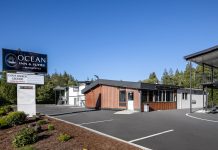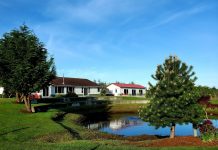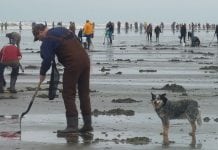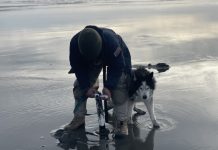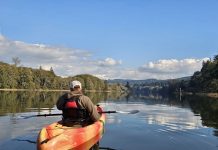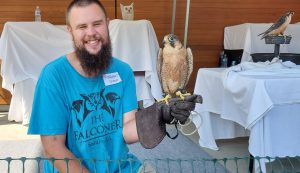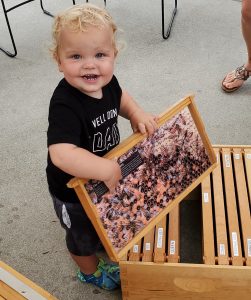This calendar is the place to find fun events happening throughout Grays Harbor County including Aberdeen, Hoquiam, Westport, Ocean Shores, Elma, Montesano and beyond.
Have an event that isn’t listed? Please email events@GraysHarborTalk.com with the following information:
- Name of Event
- Date, time and location (name of business if applicable and complete address)
- Organizer(s) name
- Cost
- URL to purchase tickets
- Website URL
- SHORT description of event
- Photo
Our editors will review and post within a few business days.

Pilot Your Spring Break Adventure!
Enjoy a spring break packed with awesome activities that launch, fly, and soar up in the air. Pilot a real Huey Helicopter. Make your own wearable wings. Command a mission to the red planet and create a Mars rover. Meet the Raptor Ambassadors and learn about birds of prey. Engineer and launch paper airplanes, make your own airship, and more!
Special events and activities vary daily. See dates and times below. Make your reservations online and save $2!
March 24–April 2
• Make your own wearable wings (March 24–30)
• Design pinwheels & propellers (March 24–30)
• Learn how seeds travel through the air (March 24–30)
• Create a salad spinner nebula print (March 24–26)
• Meet Alice in Wonderland ballerinas from Studio West Dance Academy (March 26, 10:00 a.m. – 12:00 p.m.)
• Make and launch paper airplanes (March 27–30, 12:00 p.m. – 4:00 p.m.)
• Design your own airship (March 31–April 6)
• Create a Mars rover (March 31–April 6)
• Learn about cockroaches and other winged insects (March 31–April 6)
• Build Kites & Flyers (March 31–April 6)
• Learn about birds, bugs, and blimps (March 31–April 6)
• Pilot a Huey Helicopter with the Olympic Flight Museum (March 31–April 7)
April 3–April 16
• Design your own airship (March 31–April 6)
• Create a Mars rover (March 31–April 6)
• Learn about cockroaches and other winged insects (March 31–April 6)
• Build Kites & Flyers (March 31–April 6)
• Learn about birds, bugs, and blimps (March 31–April 6)
• Pilot a Huey Helicopter with the Olympic Flight Museum (March 31–April 7)
• Learn about animals that defy gravity (April 3–8)
• Meet Raptor Ambassadors with the Falconer (April 8, 12:00 p.m. – 4:00 p.m.)
• Paint colorful planets (April 7–13)
• Craft with recycled materials and send it down a zip line (April 7 & 8, 11–13)
• Create a motorized scribble bot satellite (April 14–16)
• Chop, grate, and grind a space diet (April 14–16)

Pilot Your Spring Break Adventure!
Enjoy a spring break packed with awesome activities that launch, fly, and soar up in the air. Pilot a real Huey Helicopter. Make your own wearable wings. Command a mission to the red planet and create a Mars rover. Meet the Raptor Ambassadors and learn about birds of prey. Engineer and launch paper airplanes, make your own airship, and more!
Special events and activities vary daily. See dates and times below. Make your reservations online and save $2!
March 24–April 2
• Make your own wearable wings (March 24–30)
• Design pinwheels & propellers (March 24–30)
• Learn how seeds travel through the air (March 24–30)
• Create a salad spinner nebula print (March 24–26)
• Meet Alice in Wonderland ballerinas from Studio West Dance Academy (March 26, 10:00 a.m. – 12:00 p.m.)
• Make and launch paper airplanes (March 27–30, 12:00 p.m. – 4:00 p.m.)
• Design your own airship (March 31–April 6)
• Create a Mars rover (March 31–April 6)
• Learn about cockroaches and other winged insects (March 31–April 6)
• Build Kites & Flyers (March 31–April 6)
• Learn about birds, bugs, and blimps (March 31–April 6)
• Pilot a Huey Helicopter with the Olympic Flight Museum (March 31–April 7)
April 3–April 16
• Design your own airship (March 31–April 6)
• Create a Mars rover (March 31–April 6)
• Learn about cockroaches and other winged insects (March 31–April 6)
• Build Kites & Flyers (March 31–April 6)
• Learn about birds, bugs, and blimps (March 31–April 6)
• Pilot a Huey Helicopter with the Olympic Flight Museum (March 31–April 7)
• Learn about animals that defy gravity (April 3–8)
• Meet Raptor Ambassadors with the Falconer (April 8, 12:00 p.m. – 4:00 p.m.)
• Paint colorful planets (April 7–13)
• Craft with recycled materials and send it down a zip line (April 7 & 8, 11–13)
• Create a motorized scribble bot satellite (April 14–16)
• Chop, grate, and grind a space diet (April 14–16)
WDFW approves final coastal razor clam digs of the spring season beginning Thursday, May 4
OLYMPIA – Washington Department of Fish and Wildlife (WDFW) shellfish managers today confirmed the final coastal razor clam digs of the season can proceed as planned from May 4-14.
“This last tide series had lots of happy diggers, and we’re anticipating more of the same for this upcoming tide series to close out the season,” said Bryce Blumenthal, a WDFW coastal shellfish biologist.
On all open beaches – Long Beach, Twin Harbors, Mocrocks, and Copalis – the daily limit is 20 razor clams instead of the usual 15. Each digger’s clams must be kept in a separate container, and all diggers must keep the first 20 clams they dig, regardless of size or condition.
Not all beaches are open for every dig, so diggers are encouraged to make sure their intended destination is open before heading out. The most successful digging occurs within two hours before the listed time of low tide.
Digging is allowed from midnight until 12 p.m. only on May 4-10. Since low tides on May 11-14 are near or after 12 p.m., digging will be allowed from 4 a.m. until 4 p.m. for those specific days only.
The following digs during morning (a.m.) low tides are scheduled (digging allowed 4 a.m. until 4 p.m. on May 11-14 only):
- May 4, Thursday, 6:32 AM; -0.2 feet; Long Beach, Twin Harbors, Copalis
- May 5, Friday, 7:10 AM; -0.8 feet; Long Beach, Twin Harbors, Mocrocks
- May 6, Saturday, 7:49 AM; -1.2 feet; Long Beach, Twin Harbors, Copalis
- May 7, Sunday, 8:31 AM; -1.4 feet; Long Beach, Twin Harbors, Mocrocks
- May 8, Monday, 9:15 AM; -1.5 feet; Long Beach, Twin Harbors, Copalis
- May 9, Tuesday, 10:03 AM; -1.3 feet; Long Beach, Twin Harbors, Mocrocks
- May 10, Wednesday, 10:57 AM; -1.0 feet; Long Beach, Twin Harbors, Copalis
- May 11, Thursday, 11:56 AM; -0.6 feet; Long Beach, Twin Harbors, Mocrocks (digging allowed 4 AM until 4 PM only)
- May 12, Friday, 12:59 PM; -0.2 feet; Long Beach, Twin Harbors, Copalis (digging allowed 4 AM until 4 PM only)
- May 13, Saturday, 2:03 PM; 0.1 feet; Long Beach, Twin Harbors, Mocrocks (digging allowed 4 AM until 4 PM only)
- May 14, Sunday, 3:03 PM; 0.4 feet; Long Beach, Twin Harbors, Copalis (digging allowed 4 AM until 4 PM only)
WDFW plans to announce tentative digging opportunities in early fall for the 2023-2024 season via the WDFW razor clam webpage. This summer, WDFW will monitor, domoic acid, a natural marine toxin produced by certain types of marine algae, that can be harmful or fatal if consumed in sufficient quantities. More information about domoic acid, as well as current levels at ocean beaches, can be found on WDFW’s domoic acid webpage and on the DOH webpage.
As in past years, WDFW is asking beachgoers to avoid disturbing nesting snowy plovers – a small bird with gray wings and a white breast – by staying out of the dunes and posted areas along the southwest coast. Snowy plover nests are nearly invisible, and it is vital to give birds the space to live and thrive during nesting period, especially along the southern end on Twin Harbors – known as Midway Beach – and the north end of Long Beach.
Avoid leaving leftover food or trash – which attracts predators – on the beach and picnic areas, keep pets on a leash, stay out of dunes, and avoid areas which are clearly marked with posted signs. When driving on the beach, please respect the 25 MPH speed limit and enter only at designated access points. Stay on the hard-packed sand near the high tide line to avoid crushing clam beds and snowy plover nests.
Several sections of coastal beaches are closed to driving between now through Labor Day, except on days and hours when the recreational razor clam digging is open. These areas are clearly marked with signs.
To participate, razor clam diggers must purchase their new 2023-2024 recreational fishing or shellfishing licenses, available from hundreds of license vendors around the state. All diggers age 15 or older must have an applicable fishing license to harvest razor clams on any beach. To be notified of in-season rule changes as they are announced sign up for email notifications at wdfw.wa.gov/about/lists.
The Washington Department of Fish and Wildlife works to preserve, protect, and perpetuate fish, wildlife and ecosystems while providing sustainable fish and wildlife recreational and commercial opportunities.
WDFW approves final coastal razor clam digs of the spring season beginning Thursday, May 4
OLYMPIA – Washington Department of Fish and Wildlife (WDFW) shellfish managers today confirmed the final coastal razor clam digs of the season can proceed as planned from May 4-14.
“This last tide series had lots of happy diggers, and we’re anticipating more of the same for this upcoming tide series to close out the season,” said Bryce Blumenthal, a WDFW coastal shellfish biologist.
On all open beaches – Long Beach, Twin Harbors, Mocrocks, and Copalis – the daily limit is 20 razor clams instead of the usual 15. Each digger’s clams must be kept in a separate container, and all diggers must keep the first 20 clams they dig, regardless of size or condition.
Not all beaches are open for every dig, so diggers are encouraged to make sure their intended destination is open before heading out. The most successful digging occurs within two hours before the listed time of low tide.
Digging is allowed from midnight until 12 p.m. only on May 4-10. Since low tides on May 11-14 are near or after 12 p.m., digging will be allowed from 4 a.m. until 4 p.m. for those specific days only.
The following digs during morning (a.m.) low tides are scheduled (digging allowed 4 a.m. until 4 p.m. on May 11-14 only):
- May 4, Thursday, 6:32 AM; -0.2 feet; Long Beach, Twin Harbors, Copalis
- May 5, Friday, 7:10 AM; -0.8 feet; Long Beach, Twin Harbors, Mocrocks
- May 6, Saturday, 7:49 AM; -1.2 feet; Long Beach, Twin Harbors, Copalis
- May 7, Sunday, 8:31 AM; -1.4 feet; Long Beach, Twin Harbors, Mocrocks
- May 8, Monday, 9:15 AM; -1.5 feet; Long Beach, Twin Harbors, Copalis
- May 9, Tuesday, 10:03 AM; -1.3 feet; Long Beach, Twin Harbors, Mocrocks
- May 10, Wednesday, 10:57 AM; -1.0 feet; Long Beach, Twin Harbors, Copalis
- May 11, Thursday, 11:56 AM; -0.6 feet; Long Beach, Twin Harbors, Mocrocks (digging allowed 4 AM until 4 PM only)
- May 12, Friday, 12:59 PM; -0.2 feet; Long Beach, Twin Harbors, Copalis (digging allowed 4 AM until 4 PM only)
- May 13, Saturday, 2:03 PM; 0.1 feet; Long Beach, Twin Harbors, Mocrocks (digging allowed 4 AM until 4 PM only)
- May 14, Sunday, 3:03 PM; 0.4 feet; Long Beach, Twin Harbors, Copalis (digging allowed 4 AM until 4 PM only)
WDFW plans to announce tentative digging opportunities in early fall for the 2023-2024 season via the WDFW razor clam webpage. This summer, WDFW will monitor, domoic acid, a natural marine toxin produced by certain types of marine algae, that can be harmful or fatal if consumed in sufficient quantities. More information about domoic acid, as well as current levels at ocean beaches, can be found on WDFW’s domoic acid webpage and on the DOH webpage.
As in past years, WDFW is asking beachgoers to avoid disturbing nesting snowy plovers – a small bird with gray wings and a white breast – by staying out of the dunes and posted areas along the southwest coast. Snowy plover nests are nearly invisible, and it is vital to give birds the space to live and thrive during nesting period, especially along the southern end on Twin Harbors – known as Midway Beach – and the north end of Long Beach.
Avoid leaving leftover food or trash – which attracts predators – on the beach and picnic areas, keep pets on a leash, stay out of dunes, and avoid areas which are clearly marked with posted signs. When driving on the beach, please respect the 25 MPH speed limit and enter only at designated access points. Stay on the hard-packed sand near the high tide line to avoid crushing clam beds and snowy plover nests.
Several sections of coastal beaches are closed to driving between now through Labor Day, except on days and hours when the recreational razor clam digging is open. These areas are clearly marked with signs.
To participate, razor clam diggers must purchase their new 2023-2024 recreational fishing or shellfishing licenses, available from hundreds of license vendors around the state. All diggers age 15 or older must have an applicable fishing license to harvest razor clams on any beach. To be notified of in-season rule changes as they are announced sign up for email notifications at wdfw.wa.gov/about/lists.
The Washington Department of Fish and Wildlife works to preserve, protect, and perpetuate fish, wildlife and ecosystems while providing sustainable fish and wildlife recreational and commercial opportunities.
WDFW approves final coastal razor clam digs of the spring season beginning Thursday, May 4
OLYMPIA – Washington Department of Fish and Wildlife (WDFW) shellfish managers today confirmed the final coastal razor clam digs of the season can proceed as planned from May 4-14.
“This last tide series had lots of happy diggers, and we’re anticipating more of the same for this upcoming tide series to close out the season,” said Bryce Blumenthal, a WDFW coastal shellfish biologist.
On all open beaches – Long Beach, Twin Harbors, Mocrocks, and Copalis – the daily limit is 20 razor clams instead of the usual 15. Each digger’s clams must be kept in a separate container, and all diggers must keep the first 20 clams they dig, regardless of size or condition.
Not all beaches are open for every dig, so diggers are encouraged to make sure their intended destination is open before heading out. The most successful digging occurs within two hours before the listed time of low tide.
Digging is allowed from midnight until 12 p.m. only on May 4-10. Since low tides on May 11-14 are near or after 12 p.m., digging will be allowed from 4 a.m. until 4 p.m. for those specific days only.
The following digs during morning (a.m.) low tides are scheduled (digging allowed 4 a.m. until 4 p.m. on May 11-14 only):
- May 4, Thursday, 6:32 AM; -0.2 feet; Long Beach, Twin Harbors, Copalis
- May 5, Friday, 7:10 AM; -0.8 feet; Long Beach, Twin Harbors, Mocrocks
- May 6, Saturday, 7:49 AM; -1.2 feet; Long Beach, Twin Harbors, Copalis
- May 7, Sunday, 8:31 AM; -1.4 feet; Long Beach, Twin Harbors, Mocrocks
- May 8, Monday, 9:15 AM; -1.5 feet; Long Beach, Twin Harbors, Copalis
- May 9, Tuesday, 10:03 AM; -1.3 feet; Long Beach, Twin Harbors, Mocrocks
- May 10, Wednesday, 10:57 AM; -1.0 feet; Long Beach, Twin Harbors, Copalis
- May 11, Thursday, 11:56 AM; -0.6 feet; Long Beach, Twin Harbors, Mocrocks (digging allowed 4 AM until 4 PM only)
- May 12, Friday, 12:59 PM; -0.2 feet; Long Beach, Twin Harbors, Copalis (digging allowed 4 AM until 4 PM only)
- May 13, Saturday, 2:03 PM; 0.1 feet; Long Beach, Twin Harbors, Mocrocks (digging allowed 4 AM until 4 PM only)
- May 14, Sunday, 3:03 PM; 0.4 feet; Long Beach, Twin Harbors, Copalis (digging allowed 4 AM until 4 PM only)
WDFW plans to announce tentative digging opportunities in early fall for the 2023-2024 season via the WDFW razor clam webpage. This summer, WDFW will monitor, domoic acid, a natural marine toxin produced by certain types of marine algae, that can be harmful or fatal if consumed in sufficient quantities. More information about domoic acid, as well as current levels at ocean beaches, can be found on WDFW’s domoic acid webpage and on the DOH webpage.
As in past years, WDFW is asking beachgoers to avoid disturbing nesting snowy plovers – a small bird with gray wings and a white breast – by staying out of the dunes and posted areas along the southwest coast. Snowy plover nests are nearly invisible, and it is vital to give birds the space to live and thrive during nesting period, especially along the southern end on Twin Harbors – known as Midway Beach – and the north end of Long Beach.
Avoid leaving leftover food or trash – which attracts predators – on the beach and picnic areas, keep pets on a leash, stay out of dunes, and avoid areas which are clearly marked with posted signs. When driving on the beach, please respect the 25 MPH speed limit and enter only at designated access points. Stay on the hard-packed sand near the high tide line to avoid crushing clam beds and snowy plover nests.
Several sections of coastal beaches are closed to driving between now through Labor Day, except on days and hours when the recreational razor clam digging is open. These areas are clearly marked with signs.
To participate, razor clam diggers must purchase their new 2023-2024 recreational fishing or shellfishing licenses, available from hundreds of license vendors around the state. All diggers age 15 or older must have an applicable fishing license to harvest razor clams on any beach. To be notified of in-season rule changes as they are announced sign up for email notifications at wdfw.wa.gov/about/lists.
The Washington Department of Fish and Wildlife works to preserve, protect, and perpetuate fish, wildlife and ecosystems while providing sustainable fish and wildlife recreational and commercial opportunities.
WDFW approves final coastal razor clam digs of the spring season beginning Thursday, May 4
OLYMPIA – Washington Department of Fish and Wildlife (WDFW) shellfish managers today confirmed the final coastal razor clam digs of the season can proceed as planned from May 4-14.
“This last tide series had lots of happy diggers, and we’re anticipating more of the same for this upcoming tide series to close out the season,” said Bryce Blumenthal, a WDFW coastal shellfish biologist.
On all open beaches – Long Beach, Twin Harbors, Mocrocks, and Copalis – the daily limit is 20 razor clams instead of the usual 15. Each digger’s clams must be kept in a separate container, and all diggers must keep the first 20 clams they dig, regardless of size or condition.
Not all beaches are open for every dig, so diggers are encouraged to make sure their intended destination is open before heading out. The most successful digging occurs within two hours before the listed time of low tide.
Digging is allowed from midnight until 12 p.m. only on May 4-10. Since low tides on May 11-14 are near or after 12 p.m., digging will be allowed from 4 a.m. until 4 p.m. for those specific days only.
The following digs during morning (a.m.) low tides are scheduled (digging allowed 4 a.m. until 4 p.m. on May 11-14 only):
- May 4, Thursday, 6:32 AM; -0.2 feet; Long Beach, Twin Harbors, Copalis
- May 5, Friday, 7:10 AM; -0.8 feet; Long Beach, Twin Harbors, Mocrocks
- May 6, Saturday, 7:49 AM; -1.2 feet; Long Beach, Twin Harbors, Copalis
- May 7, Sunday, 8:31 AM; -1.4 feet; Long Beach, Twin Harbors, Mocrocks
- May 8, Monday, 9:15 AM; -1.5 feet; Long Beach, Twin Harbors, Copalis
- May 9, Tuesday, 10:03 AM; -1.3 feet; Long Beach, Twin Harbors, Mocrocks
- May 10, Wednesday, 10:57 AM; -1.0 feet; Long Beach, Twin Harbors, Copalis
- May 11, Thursday, 11:56 AM; -0.6 feet; Long Beach, Twin Harbors, Mocrocks (digging allowed 4 AM until 4 PM only)
- May 12, Friday, 12:59 PM; -0.2 feet; Long Beach, Twin Harbors, Copalis (digging allowed 4 AM until 4 PM only)
- May 13, Saturday, 2:03 PM; 0.1 feet; Long Beach, Twin Harbors, Mocrocks (digging allowed 4 AM until 4 PM only)
- May 14, Sunday, 3:03 PM; 0.4 feet; Long Beach, Twin Harbors, Copalis (digging allowed 4 AM until 4 PM only)
WDFW plans to announce tentative digging opportunities in early fall for the 2023-2024 season via the WDFW razor clam webpage. This summer, WDFW will monitor, domoic acid, a natural marine toxin produced by certain types of marine algae, that can be harmful or fatal if consumed in sufficient quantities. More information about domoic acid, as well as current levels at ocean beaches, can be found on WDFW’s domoic acid webpage and on the DOH webpage.
As in past years, WDFW is asking beachgoers to avoid disturbing nesting snowy plovers – a small bird with gray wings and a white breast – by staying out of the dunes and posted areas along the southwest coast. Snowy plover nests are nearly invisible, and it is vital to give birds the space to live and thrive during nesting period, especially along the southern end on Twin Harbors – known as Midway Beach – and the north end of Long Beach.
Avoid leaving leftover food or trash – which attracts predators – on the beach and picnic areas, keep pets on a leash, stay out of dunes, and avoid areas which are clearly marked with posted signs. When driving on the beach, please respect the 25 MPH speed limit and enter only at designated access points. Stay on the hard-packed sand near the high tide line to avoid crushing clam beds and snowy plover nests.
Several sections of coastal beaches are closed to driving between now through Labor Day, except on days and hours when the recreational razor clam digging is open. These areas are clearly marked with signs.
To participate, razor clam diggers must purchase their new 2023-2024 recreational fishing or shellfishing licenses, available from hundreds of license vendors around the state. All diggers age 15 or older must have an applicable fishing license to harvest razor clams on any beach. To be notified of in-season rule changes as they are announced sign up for email notifications at wdfw.wa.gov/about/lists.
The Washington Department of Fish and Wildlife works to preserve, protect, and perpetuate fish, wildlife and ecosystems while providing sustainable fish and wildlife recreational and commercial opportunities.
WDFW approves final coastal razor clam digs of the spring season beginning Thursday, May 4
OLYMPIA – Washington Department of Fish and Wildlife (WDFW) shellfish managers today confirmed the final coastal razor clam digs of the season can proceed as planned from May 4-14.
“This last tide series had lots of happy diggers, and we’re anticipating more of the same for this upcoming tide series to close out the season,” said Bryce Blumenthal, a WDFW coastal shellfish biologist.
On all open beaches – Long Beach, Twin Harbors, Mocrocks, and Copalis – the daily limit is 20 razor clams instead of the usual 15. Each digger’s clams must be kept in a separate container, and all diggers must keep the first 20 clams they dig, regardless of size or condition.
Not all beaches are open for every dig, so diggers are encouraged to make sure their intended destination is open before heading out. The most successful digging occurs within two hours before the listed time of low tide.
Digging is allowed from midnight until 12 p.m. only on May 4-10. Since low tides on May 11-14 are near or after 12 p.m., digging will be allowed from 4 a.m. until 4 p.m. for those specific days only.
The following digs during morning (a.m.) low tides are scheduled (digging allowed 4 a.m. until 4 p.m. on May 11-14 only):
- May 4, Thursday, 6:32 AM; -0.2 feet; Long Beach, Twin Harbors, Copalis
- May 5, Friday, 7:10 AM; -0.8 feet; Long Beach, Twin Harbors, Mocrocks
- May 6, Saturday, 7:49 AM; -1.2 feet; Long Beach, Twin Harbors, Copalis
- May 7, Sunday, 8:31 AM; -1.4 feet; Long Beach, Twin Harbors, Mocrocks
- May 8, Monday, 9:15 AM; -1.5 feet; Long Beach, Twin Harbors, Copalis
- May 9, Tuesday, 10:03 AM; -1.3 feet; Long Beach, Twin Harbors, Mocrocks
- May 10, Wednesday, 10:57 AM; -1.0 feet; Long Beach, Twin Harbors, Copalis
- May 11, Thursday, 11:56 AM; -0.6 feet; Long Beach, Twin Harbors, Mocrocks (digging allowed 4 AM until 4 PM only)
- May 12, Friday, 12:59 PM; -0.2 feet; Long Beach, Twin Harbors, Copalis (digging allowed 4 AM until 4 PM only)
- May 13, Saturday, 2:03 PM; 0.1 feet; Long Beach, Twin Harbors, Mocrocks (digging allowed 4 AM until 4 PM only)
- May 14, Sunday, 3:03 PM; 0.4 feet; Long Beach, Twin Harbors, Copalis (digging allowed 4 AM until 4 PM only)
WDFW plans to announce tentative digging opportunities in early fall for the 2023-2024 season via the WDFW razor clam webpage. This summer, WDFW will monitor, domoic acid, a natural marine toxin produced by certain types of marine algae, that can be harmful or fatal if consumed in sufficient quantities. More information about domoic acid, as well as current levels at ocean beaches, can be found on WDFW’s domoic acid webpage and on the DOH webpage.
As in past years, WDFW is asking beachgoers to avoid disturbing nesting snowy plovers – a small bird with gray wings and a white breast – by staying out of the dunes and posted areas along the southwest coast. Snowy plover nests are nearly invisible, and it is vital to give birds the space to live and thrive during nesting period, especially along the southern end on Twin Harbors – known as Midway Beach – and the north end of Long Beach.
Avoid leaving leftover food or trash – which attracts predators – on the beach and picnic areas, keep pets on a leash, stay out of dunes, and avoid areas which are clearly marked with posted signs. When driving on the beach, please respect the 25 MPH speed limit and enter only at designated access points. Stay on the hard-packed sand near the high tide line to avoid crushing clam beds and snowy plover nests.
Several sections of coastal beaches are closed to driving between now through Labor Day, except on days and hours when the recreational razor clam digging is open. These areas are clearly marked with signs.
To participate, razor clam diggers must purchase their new 2023-2024 recreational fishing or shellfishing licenses, available from hundreds of license vendors around the state. All diggers age 15 or older must have an applicable fishing license to harvest razor clams on any beach. To be notified of in-season rule changes as they are announced sign up for email notifications at wdfw.wa.gov/about/lists.
The Washington Department of Fish and Wildlife works to preserve, protect, and perpetuate fish, wildlife and ecosystems while providing sustainable fish and wildlife recreational and commercial opportunities.
WDFW approves final coastal razor clam digs of the spring season beginning Thursday, May 4
OLYMPIA – Washington Department of Fish and Wildlife (WDFW) shellfish managers today confirmed the final coastal razor clam digs of the season can proceed as planned from May 4-14.
“This last tide series had lots of happy diggers, and we’re anticipating more of the same for this upcoming tide series to close out the season,” said Bryce Blumenthal, a WDFW coastal shellfish biologist.
On all open beaches – Long Beach, Twin Harbors, Mocrocks, and Copalis – the daily limit is 20 razor clams instead of the usual 15. Each digger’s clams must be kept in a separate container, and all diggers must keep the first 20 clams they dig, regardless of size or condition.
Not all beaches are open for every dig, so diggers are encouraged to make sure their intended destination is open before heading out. The most successful digging occurs within two hours before the listed time of low tide.
Digging is allowed from midnight until 12 p.m. only on May 4-10. Since low tides on May 11-14 are near or after 12 p.m., digging will be allowed from 4 a.m. until 4 p.m. for those specific days only.
The following digs during morning (a.m.) low tides are scheduled (digging allowed 4 a.m. until 4 p.m. on May 11-14 only):
- May 4, Thursday, 6:32 AM; -0.2 feet; Long Beach, Twin Harbors, Copalis
- May 5, Friday, 7:10 AM; -0.8 feet; Long Beach, Twin Harbors, Mocrocks
- May 6, Saturday, 7:49 AM; -1.2 feet; Long Beach, Twin Harbors, Copalis
- May 7, Sunday, 8:31 AM; -1.4 feet; Long Beach, Twin Harbors, Mocrocks
- May 8, Monday, 9:15 AM; -1.5 feet; Long Beach, Twin Harbors, Copalis
- May 9, Tuesday, 10:03 AM; -1.3 feet; Long Beach, Twin Harbors, Mocrocks
- May 10, Wednesday, 10:57 AM; -1.0 feet; Long Beach, Twin Harbors, Copalis
- May 11, Thursday, 11:56 AM; -0.6 feet; Long Beach, Twin Harbors, Mocrocks (digging allowed 4 AM until 4 PM only)
- May 12, Friday, 12:59 PM; -0.2 feet; Long Beach, Twin Harbors, Copalis (digging allowed 4 AM until 4 PM only)
- May 13, Saturday, 2:03 PM; 0.1 feet; Long Beach, Twin Harbors, Mocrocks (digging allowed 4 AM until 4 PM only)
- May 14, Sunday, 3:03 PM; 0.4 feet; Long Beach, Twin Harbors, Copalis (digging allowed 4 AM until 4 PM only)
WDFW plans to announce tentative digging opportunities in early fall for the 2023-2024 season via the WDFW razor clam webpage. This summer, WDFW will monitor, domoic acid, a natural marine toxin produced by certain types of marine algae, that can be harmful or fatal if consumed in sufficient quantities. More information about domoic acid, as well as current levels at ocean beaches, can be found on WDFW’s domoic acid webpage and on the DOH webpage.
As in past years, WDFW is asking beachgoers to avoid disturbing nesting snowy plovers – a small bird with gray wings and a white breast – by staying out of the dunes and posted areas along the southwest coast. Snowy plover nests are nearly invisible, and it is vital to give birds the space to live and thrive during nesting period, especially along the southern end on Twin Harbors – known as Midway Beach – and the north end of Long Beach.
Avoid leaving leftover food or trash – which attracts predators – on the beach and picnic areas, keep pets on a leash, stay out of dunes, and avoid areas which are clearly marked with posted signs. When driving on the beach, please respect the 25 MPH speed limit and enter only at designated access points. Stay on the hard-packed sand near the high tide line to avoid crushing clam beds and snowy plover nests.
Several sections of coastal beaches are closed to driving between now through Labor Day, except on days and hours when the recreational razor clam digging is open. These areas are clearly marked with signs.
To participate, razor clam diggers must purchase their new 2023-2024 recreational fishing or shellfishing licenses, available from hundreds of license vendors around the state. All diggers age 15 or older must have an applicable fishing license to harvest razor clams on any beach. To be notified of in-season rule changes as they are announced sign up for email notifications at wdfw.wa.gov/about/lists.
The Washington Department of Fish and Wildlife works to preserve, protect, and perpetuate fish, wildlife and ecosystems while providing sustainable fish and wildlife recreational and commercial opportunities.
WDFW approves final coastal razor clam digs of the spring season beginning Thursday, May 4
OLYMPIA – Washington Department of Fish and Wildlife (WDFW) shellfish managers today confirmed the final coastal razor clam digs of the season can proceed as planned from May 4-14.
“This last tide series had lots of happy diggers, and we’re anticipating more of the same for this upcoming tide series to close out the season,” said Bryce Blumenthal, a WDFW coastal shellfish biologist.
On all open beaches – Long Beach, Twin Harbors, Mocrocks, and Copalis – the daily limit is 20 razor clams instead of the usual 15. Each digger’s clams must be kept in a separate container, and all diggers must keep the first 20 clams they dig, regardless of size or condition.
Not all beaches are open for every dig, so diggers are encouraged to make sure their intended destination is open before heading out. The most successful digging occurs within two hours before the listed time of low tide.
Digging is allowed from midnight until 12 p.m. only on May 4-10. Since low tides on May 11-14 are near or after 12 p.m., digging will be allowed from 4 a.m. until 4 p.m. for those specific days only.
The following digs during morning (a.m.) low tides are scheduled (digging allowed 4 a.m. until 4 p.m. on May 11-14 only):
- May 4, Thursday, 6:32 AM; -0.2 feet; Long Beach, Twin Harbors, Copalis
- May 5, Friday, 7:10 AM; -0.8 feet; Long Beach, Twin Harbors, Mocrocks
- May 6, Saturday, 7:49 AM; -1.2 feet; Long Beach, Twin Harbors, Copalis
- May 7, Sunday, 8:31 AM; -1.4 feet; Long Beach, Twin Harbors, Mocrocks
- May 8, Monday, 9:15 AM; -1.5 feet; Long Beach, Twin Harbors, Copalis
- May 9, Tuesday, 10:03 AM; -1.3 feet; Long Beach, Twin Harbors, Mocrocks
- May 10, Wednesday, 10:57 AM; -1.0 feet; Long Beach, Twin Harbors, Copalis
- May 11, Thursday, 11:56 AM; -0.6 feet; Long Beach, Twin Harbors, Mocrocks (digging allowed 4 AM until 4 PM only)
- May 12, Friday, 12:59 PM; -0.2 feet; Long Beach, Twin Harbors, Copalis (digging allowed 4 AM until 4 PM only)
- May 13, Saturday, 2:03 PM; 0.1 feet; Long Beach, Twin Harbors, Mocrocks (digging allowed 4 AM until 4 PM only)
- May 14, Sunday, 3:03 PM; 0.4 feet; Long Beach, Twin Harbors, Copalis (digging allowed 4 AM until 4 PM only)
WDFW plans to announce tentative digging opportunities in early fall for the 2023-2024 season via the WDFW razor clam webpage. This summer, WDFW will monitor, domoic acid, a natural marine toxin produced by certain types of marine algae, that can be harmful or fatal if consumed in sufficient quantities. More information about domoic acid, as well as current levels at ocean beaches, can be found on WDFW’s domoic acid webpage and on the DOH webpage.
As in past years, WDFW is asking beachgoers to avoid disturbing nesting snowy plovers – a small bird with gray wings and a white breast – by staying out of the dunes and posted areas along the southwest coast. Snowy plover nests are nearly invisible, and it is vital to give birds the space to live and thrive during nesting period, especially along the southern end on Twin Harbors – known as Midway Beach – and the north end of Long Beach.
Avoid leaving leftover food or trash – which attracts predators – on the beach and picnic areas, keep pets on a leash, stay out of dunes, and avoid areas which are clearly marked with posted signs. When driving on the beach, please respect the 25 MPH speed limit and enter only at designated access points. Stay on the hard-packed sand near the high tide line to avoid crushing clam beds and snowy plover nests.
Several sections of coastal beaches are closed to driving between now through Labor Day, except on days and hours when the recreational razor clam digging is open. These areas are clearly marked with signs.
To participate, razor clam diggers must purchase their new 2023-2024 recreational fishing or shellfishing licenses, available from hundreds of license vendors around the state. All diggers age 15 or older must have an applicable fishing license to harvest razor clams on any beach. To be notified of in-season rule changes as they are announced sign up for email notifications at wdfw.wa.gov/about/lists.
The Washington Department of Fish and Wildlife works to preserve, protect, and perpetuate fish, wildlife and ecosystems while providing sustainable fish and wildlife recreational and commercial opportunities.
WDFW approves final coastal razor clam digs of the spring season beginning Thursday, May 4
OLYMPIA – Washington Department of Fish and Wildlife (WDFW) shellfish managers today confirmed the final coastal razor clam digs of the season can proceed as planned from May 4-14.
“This last tide series had lots of happy diggers, and we’re anticipating more of the same for this upcoming tide series to close out the season,” said Bryce Blumenthal, a WDFW coastal shellfish biologist.
On all open beaches – Long Beach, Twin Harbors, Mocrocks, and Copalis – the daily limit is 20 razor clams instead of the usual 15. Each digger’s clams must be kept in a separate container, and all diggers must keep the first 20 clams they dig, regardless of size or condition.
Not all beaches are open for every dig, so diggers are encouraged to make sure their intended destination is open before heading out. The most successful digging occurs within two hours before the listed time of low tide.
Digging is allowed from midnight until 12 p.m. only on May 4-10. Since low tides on May 11-14 are near or after 12 p.m., digging will be allowed from 4 a.m. until 4 p.m. for those specific days only.
The following digs during morning (a.m.) low tides are scheduled (digging allowed 4 a.m. until 4 p.m. on May 11-14 only):
- May 4, Thursday, 6:32 AM; -0.2 feet; Long Beach, Twin Harbors, Copalis
- May 5, Friday, 7:10 AM; -0.8 feet; Long Beach, Twin Harbors, Mocrocks
- May 6, Saturday, 7:49 AM; -1.2 feet; Long Beach, Twin Harbors, Copalis
- May 7, Sunday, 8:31 AM; -1.4 feet; Long Beach, Twin Harbors, Mocrocks
- May 8, Monday, 9:15 AM; -1.5 feet; Long Beach, Twin Harbors, Copalis
- May 9, Tuesday, 10:03 AM; -1.3 feet; Long Beach, Twin Harbors, Mocrocks
- May 10, Wednesday, 10:57 AM; -1.0 feet; Long Beach, Twin Harbors, Copalis
- May 11, Thursday, 11:56 AM; -0.6 feet; Long Beach, Twin Harbors, Mocrocks (digging allowed 4 AM until 4 PM only)
- May 12, Friday, 12:59 PM; -0.2 feet; Long Beach, Twin Harbors, Copalis (digging allowed 4 AM until 4 PM only)
- May 13, Saturday, 2:03 PM; 0.1 feet; Long Beach, Twin Harbors, Mocrocks (digging allowed 4 AM until 4 PM only)
- May 14, Sunday, 3:03 PM; 0.4 feet; Long Beach, Twin Harbors, Copalis (digging allowed 4 AM until 4 PM only)
WDFW plans to announce tentative digging opportunities in early fall for the 2023-2024 season via the WDFW razor clam webpage. This summer, WDFW will monitor, domoic acid, a natural marine toxin produced by certain types of marine algae, that can be harmful or fatal if consumed in sufficient quantities. More information about domoic acid, as well as current levels at ocean beaches, can be found on WDFW’s domoic acid webpage and on the DOH webpage.
As in past years, WDFW is asking beachgoers to avoid disturbing nesting snowy plovers – a small bird with gray wings and a white breast – by staying out of the dunes and posted areas along the southwest coast. Snowy plover nests are nearly invisible, and it is vital to give birds the space to live and thrive during nesting period, especially along the southern end on Twin Harbors – known as Midway Beach – and the north end of Long Beach.
Avoid leaving leftover food or trash – which attracts predators – on the beach and picnic areas, keep pets on a leash, stay out of dunes, and avoid areas which are clearly marked with posted signs. When driving on the beach, please respect the 25 MPH speed limit and enter only at designated access points. Stay on the hard-packed sand near the high tide line to avoid crushing clam beds and snowy plover nests.
Several sections of coastal beaches are closed to driving between now through Labor Day, except on days and hours when the recreational razor clam digging is open. These areas are clearly marked with signs.
To participate, razor clam diggers must purchase their new 2023-2024 recreational fishing or shellfishing licenses, available from hundreds of license vendors around the state. All diggers age 15 or older must have an applicable fishing license to harvest razor clams on any beach. To be notified of in-season rule changes as they are announced sign up for email notifications at wdfw.wa.gov/about/lists.
The Washington Department of Fish and Wildlife works to preserve, protect, and perpetuate fish, wildlife and ecosystems while providing sustainable fish and wildlife recreational and commercial opportunities.
WDFW approves final coastal razor clam digs of the spring season beginning Thursday, May 4
OLYMPIA – Washington Department of Fish and Wildlife (WDFW) shellfish managers today confirmed the final coastal razor clam digs of the season can proceed as planned from May 4-14.
“This last tide series had lots of happy diggers, and we’re anticipating more of the same for this upcoming tide series to close out the season,” said Bryce Blumenthal, a WDFW coastal shellfish biologist.
On all open beaches – Long Beach, Twin Harbors, Mocrocks, and Copalis – the daily limit is 20 razor clams instead of the usual 15. Each digger’s clams must be kept in a separate container, and all diggers must keep the first 20 clams they dig, regardless of size or condition.
Not all beaches are open for every dig, so diggers are encouraged to make sure their intended destination is open before heading out. The most successful digging occurs within two hours before the listed time of low tide.
Digging is allowed from midnight until 12 p.m. only on May 4-10. Since low tides on May 11-14 are near or after 12 p.m., digging will be allowed from 4 a.m. until 4 p.m. for those specific days only.
The following digs during morning (a.m.) low tides are scheduled (digging allowed 4 a.m. until 4 p.m. on May 11-14 only):
- May 4, Thursday, 6:32 AM; -0.2 feet; Long Beach, Twin Harbors, Copalis
- May 5, Friday, 7:10 AM; -0.8 feet; Long Beach, Twin Harbors, Mocrocks
- May 6, Saturday, 7:49 AM; -1.2 feet; Long Beach, Twin Harbors, Copalis
- May 7, Sunday, 8:31 AM; -1.4 feet; Long Beach, Twin Harbors, Mocrocks
- May 8, Monday, 9:15 AM; -1.5 feet; Long Beach, Twin Harbors, Copalis
- May 9, Tuesday, 10:03 AM; -1.3 feet; Long Beach, Twin Harbors, Mocrocks
- May 10, Wednesday, 10:57 AM; -1.0 feet; Long Beach, Twin Harbors, Copalis
- May 11, Thursday, 11:56 AM; -0.6 feet; Long Beach, Twin Harbors, Mocrocks (digging allowed 4 AM until 4 PM only)
- May 12, Friday, 12:59 PM; -0.2 feet; Long Beach, Twin Harbors, Copalis (digging allowed 4 AM until 4 PM only)
- May 13, Saturday, 2:03 PM; 0.1 feet; Long Beach, Twin Harbors, Mocrocks (digging allowed 4 AM until 4 PM only)
- May 14, Sunday, 3:03 PM; 0.4 feet; Long Beach, Twin Harbors, Copalis (digging allowed 4 AM until 4 PM only)
WDFW plans to announce tentative digging opportunities in early fall for the 2023-2024 season via the WDFW razor clam webpage. This summer, WDFW will monitor, domoic acid, a natural marine toxin produced by certain types of marine algae, that can be harmful or fatal if consumed in sufficient quantities. More information about domoic acid, as well as current levels at ocean beaches, can be found on WDFW’s domoic acid webpage and on the DOH webpage.
As in past years, WDFW is asking beachgoers to avoid disturbing nesting snowy plovers – a small bird with gray wings and a white breast – by staying out of the dunes and posted areas along the southwest coast. Snowy plover nests are nearly invisible, and it is vital to give birds the space to live and thrive during nesting period, especially along the southern end on Twin Harbors – known as Midway Beach – and the north end of Long Beach.
Avoid leaving leftover food or trash – which attracts predators – on the beach and picnic areas, keep pets on a leash, stay out of dunes, and avoid areas which are clearly marked with posted signs. When driving on the beach, please respect the 25 MPH speed limit and enter only at designated access points. Stay on the hard-packed sand near the high tide line to avoid crushing clam beds and snowy plover nests.
Several sections of coastal beaches are closed to driving between now through Labor Day, except on days and hours when the recreational razor clam digging is open. These areas are clearly marked with signs.
To participate, razor clam diggers must purchase their new 2023-2024 recreational fishing or shellfishing licenses, available from hundreds of license vendors around the state. All diggers age 15 or older must have an applicable fishing license to harvest razor clams on any beach. To be notified of in-season rule changes as they are announced sign up for email notifications at wdfw.wa.gov/about/lists.
The Washington Department of Fish and Wildlife works to preserve, protect, and perpetuate fish, wildlife and ecosystems while providing sustainable fish and wildlife recreational and commercial opportunities.
WDFW approves final coastal razor clam digs of the spring season beginning Thursday, May 4
OLYMPIA – Washington Department of Fish and Wildlife (WDFW) shellfish managers today confirmed the final coastal razor clam digs of the season can proceed as planned from May 4-14.
“This last tide series had lots of happy diggers, and we’re anticipating more of the same for this upcoming tide series to close out the season,” said Bryce Blumenthal, a WDFW coastal shellfish biologist.
On all open beaches – Long Beach, Twin Harbors, Mocrocks, and Copalis – the daily limit is 20 razor clams instead of the usual 15. Each digger’s clams must be kept in a separate container, and all diggers must keep the first 20 clams they dig, regardless of size or condition.
Not all beaches are open for every dig, so diggers are encouraged to make sure their intended destination is open before heading out. The most successful digging occurs within two hours before the listed time of low tide.
Digging is allowed from midnight until 12 p.m. only on May 4-10. Since low tides on May 11-14 are near or after 12 p.m., digging will be allowed from 4 a.m. until 4 p.m. for those specific days only.
The following digs during morning (a.m.) low tides are scheduled (digging allowed 4 a.m. until 4 p.m. on May 11-14 only):
- May 4, Thursday, 6:32 AM; -0.2 feet; Long Beach, Twin Harbors, Copalis
- May 5, Friday, 7:10 AM; -0.8 feet; Long Beach, Twin Harbors, Mocrocks
- May 6, Saturday, 7:49 AM; -1.2 feet; Long Beach, Twin Harbors, Copalis
- May 7, Sunday, 8:31 AM; -1.4 feet; Long Beach, Twin Harbors, Mocrocks
- May 8, Monday, 9:15 AM; -1.5 feet; Long Beach, Twin Harbors, Copalis
- May 9, Tuesday, 10:03 AM; -1.3 feet; Long Beach, Twin Harbors, Mocrocks
- May 10, Wednesday, 10:57 AM; -1.0 feet; Long Beach, Twin Harbors, Copalis
- May 11, Thursday, 11:56 AM; -0.6 feet; Long Beach, Twin Harbors, Mocrocks (digging allowed 4 AM until 4 PM only)
- May 12, Friday, 12:59 PM; -0.2 feet; Long Beach, Twin Harbors, Copalis (digging allowed 4 AM until 4 PM only)
- May 13, Saturday, 2:03 PM; 0.1 feet; Long Beach, Twin Harbors, Mocrocks (digging allowed 4 AM until 4 PM only)
- May 14, Sunday, 3:03 PM; 0.4 feet; Long Beach, Twin Harbors, Copalis (digging allowed 4 AM until 4 PM only)
WDFW plans to announce tentative digging opportunities in early fall for the 2023-2024 season via the WDFW razor clam webpage. This summer, WDFW will monitor, domoic acid, a natural marine toxin produced by certain types of marine algae, that can be harmful or fatal if consumed in sufficient quantities. More information about domoic acid, as well as current levels at ocean beaches, can be found on WDFW’s domoic acid webpage and on the DOH webpage.
As in past years, WDFW is asking beachgoers to avoid disturbing nesting snowy plovers – a small bird with gray wings and a white breast – by staying out of the dunes and posted areas along the southwest coast. Snowy plover nests are nearly invisible, and it is vital to give birds the space to live and thrive during nesting period, especially along the southern end on Twin Harbors – known as Midway Beach – and the north end of Long Beach.
Avoid leaving leftover food or trash – which attracts predators – on the beach and picnic areas, keep pets on a leash, stay out of dunes, and avoid areas which are clearly marked with posted signs. When driving on the beach, please respect the 25 MPH speed limit and enter only at designated access points. Stay on the hard-packed sand near the high tide line to avoid crushing clam beds and snowy plover nests.
Several sections of coastal beaches are closed to driving between now through Labor Day, except on days and hours when the recreational razor clam digging is open. These areas are clearly marked with signs.
To participate, razor clam diggers must purchase their new 2023-2024 recreational fishing or shellfishing licenses, available from hundreds of license vendors around the state. All diggers age 15 or older must have an applicable fishing license to harvest razor clams on any beach. To be notified of in-season rule changes as they are announced sign up for email notifications at wdfw.wa.gov/about/lists.
The Washington Department of Fish and Wildlife works to preserve, protect, and perpetuate fish, wildlife and ecosystems while providing sustainable fish and wildlife recreational and commercial opportunities.
WDFW approves final coastal razor clam digs of the spring season beginning Thursday, May 4
OLYMPIA – Washington Department of Fish and Wildlife (WDFW) shellfish managers today confirmed the final coastal razor clam digs of the season can proceed as planned from May 4-14.
“This last tide series had lots of happy diggers, and we’re anticipating more of the same for this upcoming tide series to close out the season,” said Bryce Blumenthal, a WDFW coastal shellfish biologist.
On all open beaches – Long Beach, Twin Harbors, Mocrocks, and Copalis – the daily limit is 20 razor clams instead of the usual 15. Each digger’s clams must be kept in a separate container, and all diggers must keep the first 20 clams they dig, regardless of size or condition.
Not all beaches are open for every dig, so diggers are encouraged to make sure their intended destination is open before heading out. The most successful digging occurs within two hours before the listed time of low tide.
Digging is allowed from midnight until 12 p.m. only on May 4-10. Since low tides on May 11-14 are near or after 12 p.m., digging will be allowed from 4 a.m. until 4 p.m. for those specific days only.
The following digs during morning (a.m.) low tides are scheduled (digging allowed 4 a.m. until 4 p.m. on May 11-14 only):
- May 4, Thursday, 6:32 AM; -0.2 feet; Long Beach, Twin Harbors, Copalis
- May 5, Friday, 7:10 AM; -0.8 feet; Long Beach, Twin Harbors, Mocrocks
- May 6, Saturday, 7:49 AM; -1.2 feet; Long Beach, Twin Harbors, Copalis
- May 7, Sunday, 8:31 AM; -1.4 feet; Long Beach, Twin Harbors, Mocrocks
- May 8, Monday, 9:15 AM; -1.5 feet; Long Beach, Twin Harbors, Copalis
- May 9, Tuesday, 10:03 AM; -1.3 feet; Long Beach, Twin Harbors, Mocrocks
- May 10, Wednesday, 10:57 AM; -1.0 feet; Long Beach, Twin Harbors, Copalis
- May 11, Thursday, 11:56 AM; -0.6 feet; Long Beach, Twin Harbors, Mocrocks (digging allowed 4 AM until 4 PM only)
- May 12, Friday, 12:59 PM; -0.2 feet; Long Beach, Twin Harbors, Copalis (digging allowed 4 AM until 4 PM only)
- May 13, Saturday, 2:03 PM; 0.1 feet; Long Beach, Twin Harbors, Mocrocks (digging allowed 4 AM until 4 PM only)
- May 14, Sunday, 3:03 PM; 0.4 feet; Long Beach, Twin Harbors, Copalis (digging allowed 4 AM until 4 PM only)
WDFW plans to announce tentative digging opportunities in early fall for the 2023-2024 season via the WDFW razor clam webpage. This summer, WDFW will monitor, domoic acid, a natural marine toxin produced by certain types of marine algae, that can be harmful or fatal if consumed in sufficient quantities. More information about domoic acid, as well as current levels at ocean beaches, can be found on WDFW’s domoic acid webpage and on the DOH webpage.
As in past years, WDFW is asking beachgoers to avoid disturbing nesting snowy plovers – a small bird with gray wings and a white breast – by staying out of the dunes and posted areas along the southwest coast. Snowy plover nests are nearly invisible, and it is vital to give birds the space to live and thrive during nesting period, especially along the southern end on Twin Harbors – known as Midway Beach – and the north end of Long Beach.
Avoid leaving leftover food or trash – which attracts predators – on the beach and picnic areas, keep pets on a leash, stay out of dunes, and avoid areas which are clearly marked with posted signs. When driving on the beach, please respect the 25 MPH speed limit and enter only at designated access points. Stay on the hard-packed sand near the high tide line to avoid crushing clam beds and snowy plover nests.
Several sections of coastal beaches are closed to driving between now through Labor Day, except on days and hours when the recreational razor clam digging is open. These areas are clearly marked with signs.
To participate, razor clam diggers must purchase their new 2023-2024 recreational fishing or shellfishing licenses, available from hundreds of license vendors around the state. All diggers age 15 or older must have an applicable fishing license to harvest razor clams on any beach. To be notified of in-season rule changes as they are announced sign up for email notifications at wdfw.wa.gov/about/lists.
The Washington Department of Fish and Wildlife works to preserve, protect, and perpetuate fish, wildlife and ecosystems while providing sustainable fish and wildlife recreational and commercial opportunities.
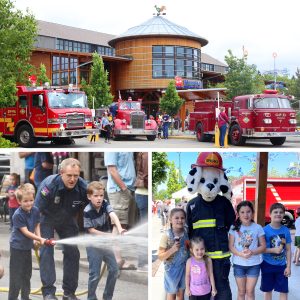
The Fire Rescue Spectacular, July 8, is the ultimate firefighter and first-responder experience for kids! At the free street fair kids can explore a fleet of emergency vehicles, meet first responders, take the Junior Fighter Challenge, enjoy free ice cream, and so much more!
Presented by Mary Bridge Children’s Hospital & Health Network in partnership with Olympia Fire Dept., and thanks to Access Partner Macy’s.
Free Street Fair Activities
• Explore Olympia’s fleet of emergency vehicles and meet first responders
• Meet Sparky the Fire Dog & Smokey the Bear
• See vintage fire trucks
• Experience the Spray Gallery
• Take the Junior Firefighter Challenge
• Enjoy special activities, festival food & free ice cream and popsicles
Inside the Museum
• See wacky Dr. Science demos
• Make an emergency candle or fire starter
• Learn how to start a campfire
• Explore first aid techniques
• Rescue toy animals from ice
All activities on the street are free to the public. Special activities in the Museum are free with admission – online reservations recommended.
With equal measures of pluck and positivity, little orphan Annie charms everyone’s hearts despite a next-to-nothing start in 1930s New York City. Annie is determined to find the parents who abandoned her years ago on the doorstep of an orphanage run by the cruel Miss Hannigan. Annie eventually foils Miss Hannigan’s evil machinations, finding a new home and family in billionaire, Oliver Warbucks, his personal secretary, Grace Farrell, and a lovable mutt named Sandy.
A great show to introduce children and adults of all ages to musical theatre! Show runs for less than one hour.
Thanks to our sponsors: Mark Rossetti State Farm, Twin Star Credit Union, and Ingram, Zelasco, and Goodwin, LLP.
With equal measures of pluck and positivity, little orphan Annie charms everyone’s hearts despite a next-to-nothing start in 1930s New York City. Annie is determined to find the parents who abandoned her years ago on the doorstep of an orphanage run by the cruel Miss Hannigan. Annie eventually foils Miss Hannigan’s evil machinations, finding a new home and family in billionaire, Oliver Warbucks, his personal secretary, Grace Farrell, and a lovable mutt named Sandy.
A great show to introduce children and adults of all ages to musical theatre! Show runs for less than one hour.
Thanks to our sponsors: Mark Rossetti State Farm, Twin Star Credit Union, and Ingram, Zelasco, and Goodwin, LLP.
With equal measures of pluck and positivity, little orphan Annie charms everyone’s hearts despite a next-to-nothing start in 1930s New York City. Annie is determined to find the parents who abandoned her years ago on the doorstep of an orphanage run by the cruel Miss Hannigan. Annie eventually foils Miss Hannigan’s evil machinations, finding a new home and family in billionaire, Oliver Warbucks, his personal secretary, Grace Farrell, and a lovable mutt named Sandy.
A great show to introduce children and adults of all ages to musical theatre! Show runs for less than one hour.
Thanks to our sponsors: Mark Rossetti State Farm, Twin Star Credit Union, and Ingram, Zelasco, and Goodwin, LLP.
Feel the beat and join the rhythm of an African drumming circle with Javoen Byrd and Awodi Drumming. 5 musical educators will be on hand with 50 drums to take kids on a powerful musical journey through indigenous West African and African American music.
Free with admission or membership. Online reservations recommended.
Visiting Artists Series in partnership with National Endowment for the Arts and sponsored by the City of Olympia
Feel the beat and join the rhythm of an African drumming circle with Javoen Byrd and Awodi Drumming. 5 musical educators will be on hand with 50 drums to take kids on a powerful musical journey through indigenous West African and African American music.
Free with admission or membership. Online reservations recommended.
Visiting Artists Series in partnership with National Endowment for the Arts and sponsored by the City of Olympia
Feel the beat and join the rhythm of an African drumming circle with Javoen Byrd and Awodi Drumming. 5 musical educators will be on hand with 50 drums to take kids on a powerful musical journey through indigenous West African and African American music.
Free with admission or membership. Online reservations recommended.
Visiting Artists Series in partnership with National Endowment for the Arts and sponsored by the City of Olympia




